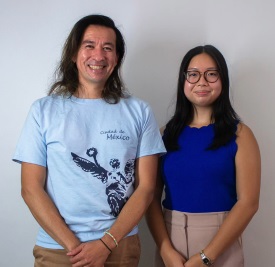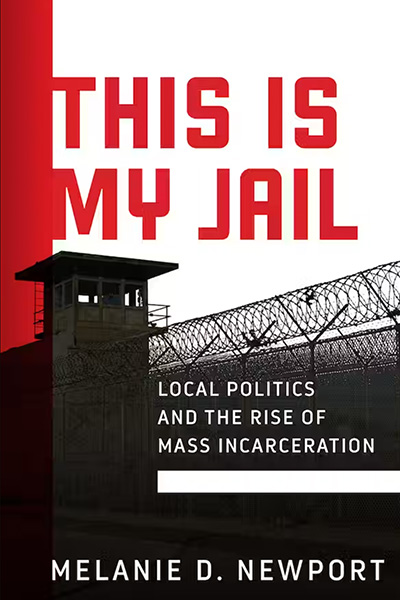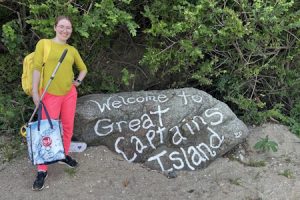 This summer, Kaitlyn Hiis LaRose ’26 (CLAS), ’26 (ED), ’27 MA focused on cleaning public beaches in Connecticut and assessing the debris. For more on their project, please see the full story in UConn Today.
This summer, Kaitlyn Hiis LaRose ’26 (CLAS), ’26 (ED), ’27 MA focused on cleaning public beaches in Connecticut and assessing the debris. For more on their project, please see the full story in UConn Today.
Author: Parker, Heather A
Jenna Ulizio ’26 and Everett Padro ’26 presenting at int’l virtual conference 6/19
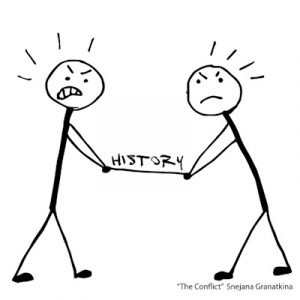 Jenna Ulizio ’26 and Everett Padro ’26 will present at the online seminar “Public history for contested and conflicting past(s)” on Thursday, June 19. The seminar is organized by the students of the Master in Digital and Public History (MADiPH) at the University of Luxembourg:
Jenna Ulizio ’26 and Everett Padro ’26 will present at the online seminar “Public history for contested and conflicting past(s)” on Thursday, June 19. The seminar is organized by the students of the Master in Digital and Public History (MADiPH) at the University of Luxembourg:
The past is subject to multiple historical interpretations. Perhaps more than ever, the current context offers many examples of contested – and sometimes conflicting – views and interpretations of the past. Beyond certain events and topics that appear very controversial, the overall production, mediation, and discussion of history are also at stake. The very existence, practices and discussion of evidence-based research are sometimes threatened. In this context, we may question what public history can bring to the discussion, what roles historians (still) have in the public interpretations of the past. How does public history deal with controversies, handle contested and conflicting topics?
CLAS Connections: Jason Chang and Karen Lau ’25 (CLAS)
Prof. Manisha Sinha, new president-elect of SHEAR
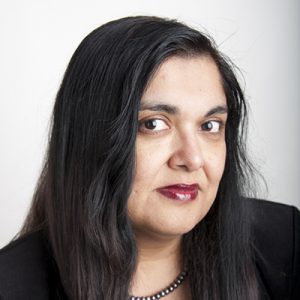 After a recent election, Professor Manisha Sinha is now the president-elect of the Society for Historians of the Early American Republic (SHEAR).
After a recent election, Professor Manisha Sinha is now the president-elect of the Society for Historians of the Early American Republic (SHEAR).
Established in 1977, the Society for Historians of the Early American Republic (SHEAR) is an association of scholars dedicated to exploring the events and the meaning of United States history between 1776 and 1861. SHEAR’s mission is to foster the study of the early republican period among professional historians, students, and the general public. It upholds the highest intellectual standards of the historical profession and encourages the broad diffusion of historical insights through all appropriate channels, including schools, museums, libraries, electronic media, public programming, archives, and publications. SHEAR cherishes a democratic ethos in scholarship and cultivates close, respectful, and productive exchanges between serious scholars at every level of experience and recognition. SHEAR membership is open to all; most members are professional historians employed in colleges, universities, museums, and historical parks and agencies, as well as independent scholars and graduate students.
Elected to the Nominating Committee for 2024-2026 were two department alumni: Antwain K. Hunter, University of North Carolina, Chapel Hill (MA ‘09) and Jessica C. Linker, Northeastern University (PhD ’17).
Congratulations to everyone!
Mansfield Historical Society and Ann Galonska Win Award
 Congratulations to the Mansfield Historical Society and Museum Director, Ann Galonska for receiving the Employer Career Advocate of the Year from UConn’s Center for Career Development!
Congratulations to the Mansfield Historical Society and Museum Director, Ann Galonska for receiving the Employer Career Advocate of the Year from UConn’s Center for Career Development!
We celebrate several years of successful internship placement with MHS and greatly appreciate Ms. Galonska’s outstanding mentorship of our students.
This Is My Jail: Local Politics & the Rise of Mass Incarceration
Tokyo Olympics Q & A with Prof Alexis Dudden
Ask the Experts: Summer Olympic Socioeconomics
To get a better understanding of the Tokyo Games’ biggest storylines, WalletHub posed the following questions to a panel of experts in the fields of sociology, economics, public policy and more. You can check out their bios and responses through the link below.
- With COVID-19 safety concerns in mind, what safety tips do you have for US tourists that will attend the Tokyo Olympics?
- Given its current vaccination count, is Tokyo safe and ready for the Olympics?
- Do you think that the US Olympic team will take first place in the medal count?
- Will Simone Biles become the first woman to win back-to-back Olympic championships in more than 50 years?
- What will be the impact of the Olympics on Tokyo’s economy?
For Professor Dudden’s replies to these questions, please check out WalletHub’s “Ask the Experts” feature.
History Welcomes Hana Maruyama to UConn
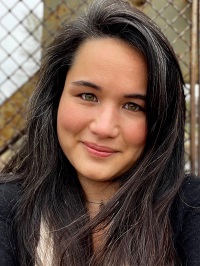
We are thrilled to welcome Professor Hana Maruyama to UConn this fall as Assistant Professor of History jointly appointed with the Asian and Asian American Studies Institute. A specialist in Digital Public History, she is part of this year’s exciting cluster hire in Anti-Racism and Anti-Bias. Professor Maruyama brings an impressive array of skills, strengths, and research and teaching interests which will advance the Department of History’s EPOCH program, the joint minor in Digital Public History being developed with Digital Media and Design, and the Asian and Asian American Studies Institute’s K-12 curriculum initiative and commitment to teaching anti-racism.
Hana C. Maruyama is a Ph.D. candidate in American Studies at the University of Minnesota, Twin Cities, with a graduate minor in Heritage Studies and Public History. This August she defends her dissertation, “AlienNation: The Role of Japanese American World War II Incarceration in Native Dispossession.” Her work on Japanese American World War II incarceration, how it relied on and reproduced settler colonial logics, and how it impacted American Indian and Alaska Native people. She is the co-creator/producer of Campu, a podcast created in partnership with the Japanese American oral history organization Densho. She formerly worked for American Public Media’s Order 9066, the Smithsonian Asian Pacific American Center, and the Heart Mountain Interpretive Center. She is yonsei (or fourth generation Japanese American) on her father’s side, with family incarcerated at Heart Mountain, Gila River, and Jerome.
Virtual London Internship – Maxwell Goldstein ’22
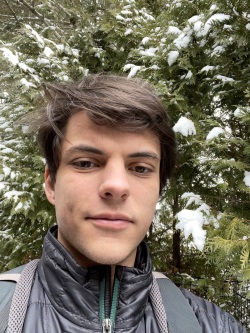
Maxwell Goldstein, ’22, a student double majoring in Anthropology and History, was amongst the first students to participate in the Virtual London Internship program this fall. We recently caught up with him to learn more about why he decided to participate in vitual programming and what the experience offererd him during a unique time globally, and in his final academic year at UConn.
“The Fall 2020 semester was definitely an interesting one and given that I was at home for it without any classes to attend in person, I wanted to do some additional work to keep me busy, as well as padding out my resume.”
Max also saw value in applying his academic learning to real world experience with an internship. “Academically, I could not have asked for a more appropriate experience. I was allowed to explore a version of what I had already been doing throughout my undergraduate coursework at UConn, and this came with different opportunities and challenges that were not present in the structured environment of a classroom. Another consideration is that it looks good on a resume, that you were willing and able to take on additional responsibilities in such a tumultuous period of time.”
Maxwell knew that there would be challenges that came with this experience. He explains, “I think the internship that I took part in helped me to continue to do my best work even with all the irregularities and issues that this semester put forth. It kept me to a schedule, and with the way fall 2020 played out, I think having that responsibility to other people, not just yourself, was important.”
When asked what advice he had for prospective students who weren’t sure about participating in a virtual internship experience, Maxwell replied, “Talk to your advisors; its their job to help you out. If you are concerned with getting an internship that meshes well with your chosen major, I wouldn’t stress too much. I am an Anthropology & History major, and if I could get an internship in History, I am sure that you can get an internship that aligns with your interests. Additionally, if you are unsure about your major, this can be an opportunity to really get a feel of what it would be like in the real world, which can help inform your future undergraduate studies at the University.”
So what’s next for Max? “I really enjoyed the work that I did over the course of the internship, and would love to participate more in this regard. I think it would be impossible to say that this internship hasn’t influenced my future plans at all; it’s provided me the expectations that I will have for future opportunities, and how I should approach them.”
For more information, contact: Education Abroad at abroad@uconn.edu
Jenifer Gaitán (HIST Stamford) Awarded SURF Grant

The Office of Undergraduate Research has announced the selection of 50 undergraduate students to receive SURF Awards in support of their summer undergraduate research projects.
Jenifer Gaitán, a senior honors History major / Women, Gender, and Sexuality Studies minor will research a project titled “Voces: First–Generation Latinx Students Discuss Their Support Networks.” Jenifer’s faculty mentor is Dr. Laura Bunyan, Sociology.
This research project is in support of Jenifer’s University Scholar project by the same name. Her faculty advisor committee members are: Laura Bunyan, Sociology (Chair); Ingrid Semaan, Sociology and Women’s, Gender, and Sexuality Studies; and Joel Blatt, History.
Project Summary: In the last decade, the number of Latinx students who have enrolled in college has increased by over 80%. Many of these students are first-generation college students, who as a whole make up approximately one-third of all college students. Despite being the largest ethnic minority group in the U.S., Latinx students are understudied. Those who are the first in their families face unique challenges while often balancing familial, work, and academic responsibilities with limited institutional support. Through in-person interviews, this project explores the systems of support first-generation Latinx students utilize through the completion of their undergraduate educations.
Jenifer is also the President of Husky Outreach for Minority Education (HOME). She is a first-generation college student and proud daughter of Ecuadorian immigrants.
